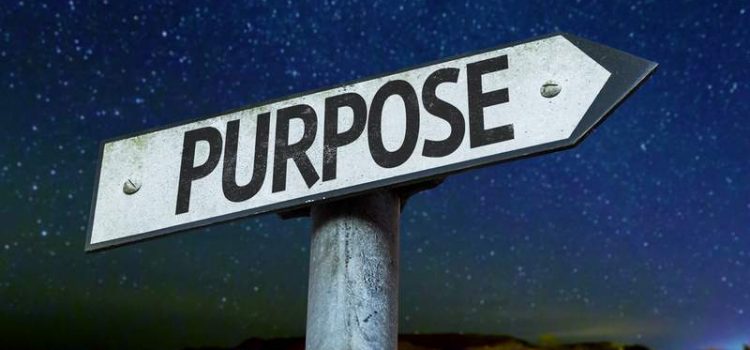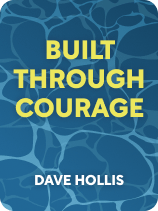

This article is an excerpt from the Shortform book guide to "Built Through Courage" by Dave Hollis. Shortform has the world's best summaries and analyses of books you should be reading.
Like this article? Sign up for a free trial here.
Why is it important to find your purpose in life? How do you achieve your purpose?
A purpose is simply something that motivates and inspires you, according to Built Through Courage by Dave Hollis. The most important reason for having a purpose is that it gives you happiness in life and erases any negativity that comes your way.
If you don’t have a purpose now, find out why you need to discover yours.
What Is Purpose?
Why is it important to find your purpose in life? It’s because purpose is a driving force that motivates and inspires you, guiding you throughout your life. Hollis explains that every person has specific talents and unique experiences. These talents and experiences are gifts, and every person has a responsibility to share their gifts with others: This is your purpose.
(Shortform note: In The Light We Carry, Michelle Obama explores several reasons why we each have a responsibility to share our unique talents and experiences with others. For example, Obama says that sharing your uniqueness (what she calls your “light”) encourages others to do the same. By noticing the ways you openly share your light, they’ll feel more comfortable sharing who they are with the world. This ultimately has a positive effect on society: People who nurture their light are more confident in their abilities to persist through challenges and enact positive social change.)
Hollis says his purpose comes from God, who created him to fulfill a specific role and gave him the talents and experiences necessary to achieve this purpose. However, he stresses that religious or spiritual beliefs aren’t necessary to accept this idea of purpose. It doesn’t matter where your purpose comes from, so long as you recognize that you have one and strive to achieve it.
(Shortform note: While Hollis’s Christian beliefs led him to pursue a singular, specific purpose coming from God, people with other religious beliefs may interpret purpose differently. For instance, Hinduism teaches that everyone’s purpose in life is to fulfill four aims. The first of these, dharma, is sometimes translated to be the person’s unique destiny or duty. It’s comparable to the purpose that Hollis describes, although it has a distinct caveat—Hindus believe that a person must fulfill their unique dharma through selfless action. The other three aims are more generalized, applying to everyone: pleasure (kama), prosperity (artha), and ultimately salvation (moksha).)
Achieving Purpose Increases Happiness
It’s important to recognize and work toward your purpose because doing so is the key to a happy and fulfilled life, Hollis says. When you recognize your purpose, the desire to achieve it can motivate you to change your life in positive ways—for example, leaving an unfulfilling job—which in turn increases your happiness and fulfillment.
(Shortform note: One study suggests that in addition to increasing happiness, pursuing your purpose is linked to stronger immune health. Purpose-focused individuals—who feel happy because they have a strong sense of meaning and help others—have genes in their immune cells that indicate a strong antibody and antiviral response and low levels of inflammation. This contrasts with pleasure-focused individuals, who may feel happy because they pursue self-gratification but have weaker immune health than purpose-focused individuals.)
In addition, recognizing your purpose can give you a stronger sense of self, which Hollis says is especially valuable in times of change or adversity. People attach their sense of identity to the roles that they play, such as their job title and marital status. This is dangerous, though, because these roles can change—you can switch jobs, get married, or get divorced. When this happens, you can lose your sense of identity, which makes it much harder to adapt to your new situation.
For example, Hollis says he felt lost when going through his divorce because he’d based so much of his identity on being a husband. After identifying his purpose, he realized that his identity was based more on being kind and helping others rather than being a husband or Disney executive.
(Shortform note: Some psychologists qualify Hollis’s warning, saying that basing your sense of identity on social roles is a problem when you base it on only one role. Basing your sense of identity on multiple social roles, on the other hand, is natural and healthy because every role you play contributes to and strengthens your overall sense of identity. Thus, expanding your number of roles can help you feel secure in your identity because even if you do lose one of your roles, the majority of your identity stays intact. Hollis arguably expanded his roles: After basing most of his identity on one role, he focused on being kind and helping others, an identity that can apply to a wide variety of roles.)
To avoid this loss of identity, Hollis says to attach your sense of identity to parts of yourself that don’t change. He includes some roles such as father and brother among these immutable elements of self, implying that these roles are a biological truth and can’t change, regardless of external circumstances. He also includes his role as a child of God and his desire to do his best every day on the list, implying that faith and intentions can be an important part of identity.
(Shortform note: In Awaken the Giant Within, Tony Robbins disagrees with the premise behind Hollis’s recommendation to attach your identity to immutable parts of yourself. Robbins says that there are no inherent aspects of a person’s identity: Even your familial roles, faith, and intentions are subject to change. Robbins views this malleability as a positive: If you believe your identity is changeable, you can constantly change and grow in positive ways. This prevents you from getting stuck or stagnating in unhealthy behaviors because you feel you can’t contradict your fixed identity. To avoid feeling a lack of identity, Robbins suggests focusing on the parts of your identity that are most important to you and behaving in ways that support them.)
Identifying Purpose
Everyone has a unique purpose based on their individual talents and experiences, as discussed above. However, it’s likely that you could apply your talents and experiences in multiple ways, making it difficult to determine how best to share your gifts with the world. Hollis recommends looking at the intersection of five components to discover the best way to achieve your purpose and live a happy and fulfilling life:
Ideals: Pursue your purpose in a way that aligns with the traits and behaviors you value. Hollis suggests identifying your ideals by considering how you want others to describe you and what makes you feel good about yourself. For example, imagine your purpose is to be a film director. Your ideals might include creativity, passion, and spreading happiness.
Enthusiasm: Pursue your purpose in a way that excites and interests you. Hollis suggests identifying what you’re enthusiastic about by considering what you love doing outside of your responsibilities. For example, you might love telling stories to your friends, and you might apply that to your purpose by telling stories through film.
Proficiency: Pursue your purpose in a way that lets you use your skills. Hollis suggests focusing on the skills you’re most proud of and confident in. For example, you might be talented at working collaboratively and directing camera angles, which you can easily apply to your directing.
Positive effect: Pursue your purpose in a way that benefits the world. Hollis specifically suggests considering how your skills can fill a need. For example, as a director, you could tell stories that provide hope and encouragement to marginalized and disenfranchised people.
Financial stability: Pursue your purpose in a way that supports you financially. For example, as a director, you might achieve financial stability by making popular movies.

———End of Preview———
Like what you just read? Read the rest of the world's best book summary and analysis of Dave Hollis's "Built Through Courage" at Shortform.
Here's what you'll find in our full Built Through Courage summary:
- Why the key to a fulfilled life is achieving your unique purpose
- How to identify and achieve the role you're meant to fill
- How to overcome the two barriers to reaching your potential






